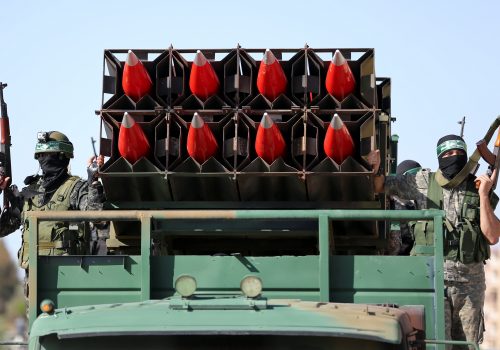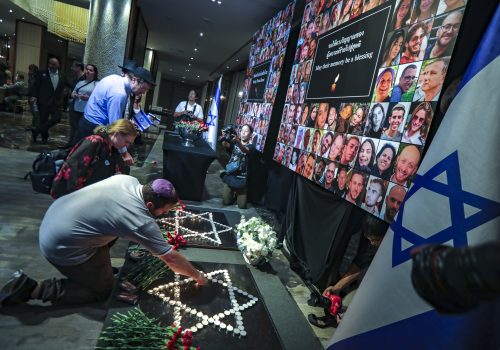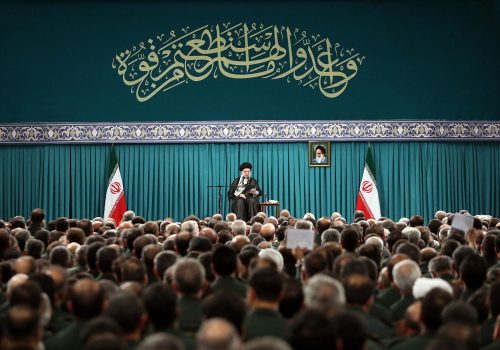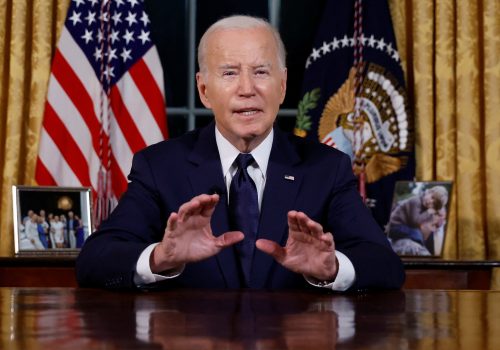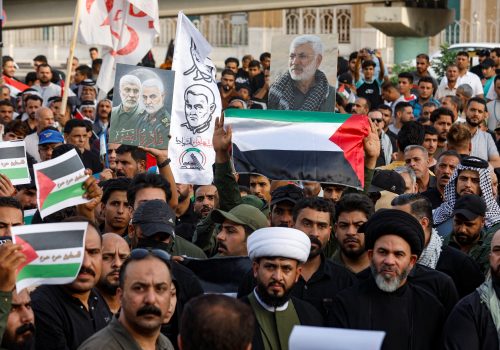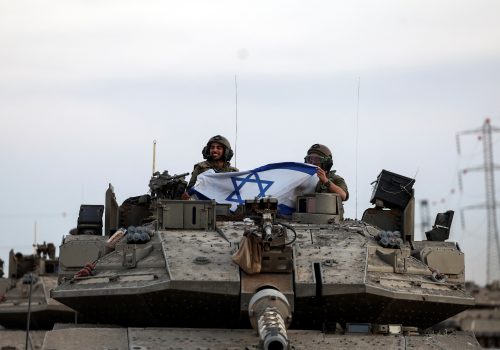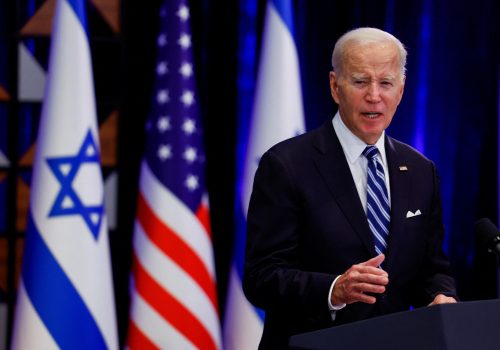Live expertise: The latest insight as the Israel-Hamas war intensifies
More than two weeks after Hamas’s brutal October 7 attack, Israel continues to mass troops at the border with Gaza in preparation for a seemingly imminent ground invasion of the enclave. Meanwhile, escalating clashes between the Israel Defense Forces and Hezbollah along the Israeli-Lebanese border, as well as rising violence in the West Bank have heightened concerns that the Israel-Hamas war will widen into a regional conflict.
Atlantic Council experts are keeping close watch on the ongoing Israel-Hamas war and on the reactions around the globe. As the conflict continues into its third week, find the latest updates below.
Click here to get caught up on last week’s expert analysis.
The latest updates
WEDNESDAY, OCTOBER 25 | 12:29 PM WASHINGTON
Six steps to disrupt Hamas and other terrorist groups’ finances
Just over thirty-eight years ago, on October 8, 1985, the modern American struggle against terrorism financing began. On that tragic day, terrorists from the Palestine Liberation Organization summarily executed an American hostage, Leon Klinghoffer, a sixty-nine-year-old, wheelchair-bound entrepreneur and World War II veteran on vacation celebrating his wedding anniversary with his wife. The terrorists subsequently dumped his corpse overboard on the hijacked Achille Lauro cruise ship. This horrific tragedy led to the eventual passage of the Anti-Terrorism Act of 1990, which for the first time provided a legal cause of action for American terrorism victims to seek justice for acts of international terrorism. Since then, the United States has continued to refine its financial toolkit to go after terrorist organizations and their financial enablers through a variety of civil and criminal legal tools.
In its October 7 attack on Israel, Hamas and other terrorist groups killed more than 1,400 people and took at least 222 hostages. Among the dead are at least thirty-two Americans, making it the deadliest foreign terrorist attack against Americans since 9/11.
The United States must again learn from tragedy. The US government has an opportunity to use its robust financial authorities to disrupt Hamas’s tactical financial capabilities. To do so, it must implement structural changes to strengthen both US and partner capabilities to combat terrorism financing and other illicit finance threats in the Middle East and beyond.
Read more from Alex Zerden, founder of Capitol Peak Strategies, a risk advisory firm, an adjunct senior fellow at the Center for a New American Security, and a former Treasury Department financial attaché:
WEDNESDAY, OCTOBER 25 | 11:21 AM WASHINGTON
The kidnapping of a peace activist by Hamas reveals the cruel irony of the situation Israel faces
Last April, my dad sent a Passover greeting to his longtime friend, Vivian Silver. He shared a small joke in the form of a traditional Passover saying: “in every generation, we must see ourselves in Egypt,” but replaced Egypt with “Kaplan Street.” He was referring to the hub of the protests that had broken out across Israel this past year, which were a response to the Israeli government’s divisive judicial reform proposals.
“My eldest grandson joined me on Kaplan,” she replied. “What a source of pride!” The friends then proceeded to exchange photos of their grandchildren and wished each other well.
At seventy-four years old, Silver—who was abducted by the militant group Hamas on October 7—is no ordinary grandmother; she is a titan of the peace movement. The international media has profiled Silver extensively. Throughout her life, Silver has worked as a tireless champion for Arabs, spending decades supporting and building friendships with her Bedouin and Gazan neighbors. She founded the Arab-Jewish Center for Empowerment, Equality, and Cooperation in the 1990s to promote a shared society.
Read more from Carmiel Arbit, nonresident senior fellow for Middle East Programs and the Scowcroft Middle East Security Initiative at the Atlantic Council:
TUESDAY, OCTOBER 24 | 11:17 AM WASHINGTON
The legal challenges in holding Iran accountable for supporting Hamas
On October 7, Hamas conducted a devastating attack on Israel, where its militants murdered civilians, took hostages, and committed other atrocities. Hamas, however, did not accomplish this attack alone. At a minimum, Iran provided funding, weapons, and training, enabling the group to achieve unprecedented scale and complexity. What is less clear is Iran’s involvement in the conduct of the attack and the accompanying atrocities. That uncertainty has limited the international community’s response. Limits in international law and consensus regarding state actor responsibility for proxy actions preclude imposing meaningful costs on Iran without expanding the conflict. Now may be the time to overcome these limits, develop consensus, and strengthen legal regimes to constrain Iran’s destabilizing support for its proxies.
There are few doubts that Hamas used Iranian-supplied weapons, equipment, and training to conduct the October 7 attacks. Since 1992, Iran has overtly provided tens of millions of dollars annually in military assistance, trained combatants, and provided political support. However, regarding the October 7 attacks, reports of Iranian involvement are mixed. Iranian Supreme Leader Ayatollah Ali Khamenei denied Iran’s involvement but praised the attack. Other reports suggested more direct involvement. For example, senior Hamas and Hezbollah officials stated that not only did Tehran approve the attack in advance, but Iranian advisors also played a role in its planning. On the other hand, there were reports that some Iranian officials were surprised by the attack.
US officials have accused Iran of being “broadly complicit” in the attacks but stopped short of saying Tehran was directly involved. In response to Iran’s broad complicity, the United States and Qatar have limited Iran’s access to the six billion dollars recently released in exchange for US hostages. More sanctions are anticipated. While such sanctions are certainly warranted, sanctions, in general, have had little coercive impact on Tehran. If Iran’s interest was to disrupt the continued normalization of Israel’s relations with Saudi Arabia and other Arab states, Tehran might consider that money well spent. Israel normalizing ties with Saudi Arabia would significantly diminish its influence in the region and could lead to the creation of a joint air defense system that would undermine its ballistic missile threat.
Read more from C. Anthony Pfaff, nonresident senior fellow with the Atlantic Council’s Iraq Initiative:
TUESDAY, OCTOBER 24 | 9:45 AM WASHINGTON
Smart in 60 Seconds: Iran shares responsibility for Hamas’s attack
MONDAY, OCTOBER 23 | 11:29 AM JERUSALEM
The Gaza war will be the final straw for Netanyahu’s long political career
Just a few weeks ago, it finally seemed that Prime Minister Benjamin Netanyahu had played a winning card after a few difficult months since the inauguration of his sixth government. In the wake of being shunned by the Joe Biden administration and having visits to Arab capitals indefinitely delayed, Netanyahu hoped to secure a grand deal with Saudi Arabia—something that could not only quell the protests against the embattled prime minister but also win him a Nobel Prize and cement his reputation as the most talented statesman in Israel. Riyadh, it seemed, was almost within reach.
But then Hamas executed a massacre in the south of Israel on October 7. The Israeli army failed to prevent and protect, Israel’s intelligence agencies failed to predict, and the Netanyahu government was slow to react to the disaster. It was the 1973 Yom Kippur War all over again. However, this time, the civilians were the ones who largely paid the horrific price of negligence and arrogance.
“We are at war; the enemy will pay an enormous price. I ordered the army to clear the towns from terrorists, and that is being done right now. We are at war, and we will win,” Netanyahu said on October 7, confident as always. At that very hour, 11:00 am, hundreds of Israelis—civilians and soldiers—were already dead. Others were hiding from terrorists or fighting for their lives, not knowing that Hamas had conquered the entire Gaza Envelope, which is part of the Western Negev within roughly four miles of the Gaza Strip border.
By the end of the day, the whole nation watched the news silently; they were in disbelief that such a scenario could happen in Israel. After being told time after time by politicians and army chiefs that Hamas had suffered severe blows and that “what will be is not what we had,” many realized that these statements were no more than hot air.
Read more from Ksenia Svetlova, a nonresident senior fellow with the Atlantic Council’s Middle East Programs and the director of the Israel-Middle East Relations Program at Mitvim:
MONDAY, OCTOBER 23 | 11:00 AM WASHINGTON
The US is cracking down on the kinds of crypto transactions that fund Hamas and other terrorist groups
On October 19, the US Department of the Treasury’s Financial Crimes Enforcement Network (FinCEN) issued a Section 311 action and a Notice of Proposed Rule Making (NPRM) identifying international Convertible Virtual Currency Mixing (CVC mixing) as a class of transactions of primary money laundering concern. CVC mixing makes cryptocurrency transactions untraceable and anonymous, thereby making it an attractive option for illicit actors who are trying to avoid detection while receiving, transacting, and cashing out their cryptocurrency holdings into fiat currency.
Section 311 of the USA PATRIOT Act is one of the most powerful tools the Treasury Department has in its toolkit to combat financial crime, including terrorist financing. Section 311 authority is delegated to FinCEN, the primary regulator for the Bank Secrecy Act (BSA) and the Financial Intelligence Unit of the United States. Section 311 provides a range of measures to defend the US financial system from money laundering and terrorist financing risks from increased due diligence and reporting requirements to prohibiting the opening and maintaining of correspondent accounts.
This decision comes as the US government continues to craft a response to Hamas’s attack on Israel and the resulting war in Gaza. Based on recent Treasury Department designations and media reporting, Hamas has used cryptocurrency to raise money and CVC mixing to hide its involvement. FinCEN’s action aims to increase transparency into CVC mixing services so authorities can take the appropriate action to prevent and disrupt terrorist financing.
The use of FinCEN’s Section 311 authority to target a class of transactions is unprecedented. The proposed rule “would require covered financial institutions to report information about transactions when they know, suspect, or have reason to suspect the transaction involves CVC mixing within or involving jurisdictions outside the United States.”
With the NPRM, FinCEN is seeking comments from the private sector and the public to provide an even-handed approach to CVC mixers going forward. It is likely that privacy advocates will have strong disagreements to these developments.
Congress has also requested answers on how Hamas and other Palestinian terrorist groups could raise millions of dollars in cryptocurrency despite being sanctioned and designated as Foreign Terrorist Organizations. While terrorist financing and money laundering remain a challenge for the formal financial system, such as banks, Thursday’s action is a significant step in understanding how Hamas and other terrorist groups and illicit actors are evading sanctions to raise money and fund their operations through cryptocurrency and how they are converting those assets into the fiat currencies. Expect to see more Treasury Department actions targeting Hamas and other terrorist groups’ financing through cryptocurrency and the formal financial system, based on the information derived from the Section 311 reporting.
—Kimberly Donovan is the director of the Economic Statecraft Initiative within the Atlantic Council’s GeoEconomics Center. Donovan was previously acting associate director of the FinCEN Intelligence Division, as well as FinCEN’s chief of staff and senior advisor to the director.
SATURDAY, OCTOBER 21 | 8:00 AM WASHINGTON
Biden’s inflection point and history’s sobering lessons
Historians may come to know US President Joe Biden’s speech to the nation this week as his “Inflection Point Address,” and it was as eloquent and compelling as any he has delivered in his lifetime.
It has the potential to be the most significant of his presidency, and it was choreographed to be seen as such. It was only the second time he has chosen to speak from behind the Resolute Desk in the Oval Office, and he did it with the backdrop of wars in Ukraine and Israel and simmering tensions around Taiwan.
Beyond that, the eighty-year-old commander in chief, who had been in Israel just a day earlier, looked sharp and spoke with the vigor of a man who understands the historic moment and his role in it. He connected the dots between Russia’s criminal war in Ukraine and Hamas’s terrorist attack on Israel, assisted by Iran.
“We’re facing an inflection point in history,” he said, “one of those moments where the decisions we make today are going to determine the future for decades to come.”
He was also clear about what connects the two, seemingly disparate conflicts. “Hamas and Putin represent different threats, but they share this in common,” he said. “They both want to completely annihilate a neighboring democracy—completely annihilate it.”
Read more from Frederick Kempe, president and CEO of the Atlantic Council:
FRIDAY, OCTOBER 20 | 4:19 PM WASHINGTON
The conflict in Gaza threatens Iraq’s stability, progress in US-Iraq relations
Militant group Hamas’s October 7 attack against Israel threatens to disrupt more than normalizing relations with Israel. Before the attack, the Middle East and North Africa were on a slow path to stabilization. Arab states and Israel were beginning to settle their differences, Saudi Arabia and Iran had established relations, and the Yemen conflict was slowly ending. In Iraq, economic prospects were slowly improving after its economy contracted due to the pandemic, exacerbated by ongoing anti-Iran protests and sectarian strife. Moreover, as the Stockholm International Peace Research Institute pointed out in March, Iraq was “enjoying its most stable period since 2003.” US-Iraq security relations even improved after the Iraqi Parliament called for the withdrawal of US troops in 2020. In August, both countries reaffirmed their commitment to increasing security cooperation.
That period of relative stability may be coming to an end. After Israel responded to Hamas’s deadly October 7 attacks, Iraqis took to the streets in massive pro-Palestinian protests, burning Israeli flags and chanting anti-American slogans. Iraqi Prime Minister Muhammed al-Sudani expressed solidarity with the Palestinian cause and has described the Israeli response as “brutal Zionist aggression.” His predecessors, including Mustafa al-Kadhimi, Haidar al-Abadi, Adil Abdul-Mahdi, and Nouri al-Maliki, echoed Sudani’s solidarity, adding that the Hamas attacks were a “natural response” to “Israeli provocations and violations.” Iraq’s Iran-backed militias, such as the Badr Organization, Asa’ib Ahl al Haq, and Kataib Hezbollah, expressed their support for the attacks and declared their readiness to attack American targets should the US intervene.
As Amir al-Kaabi and Michael Knights of the Washington Institute for Near East Policy point out, much of the Iraqi response is theater. Many militia threats were conditioned on unlikely events, such as direct US intervention or escalation. These threats also employ a little strategic ambiguity: what counts as direct or indirect intervention is up for interpretation. In fact, Kaabi and Knights describe the general response, even by Iraq’s most rabid militias, as “cautious” and, in some cases, “muted.” It should also be of little surprise that the Iraqi response is overwhelmingly pro-Hamas. As other Arab states were normalizing relations in 2022, Iraq enacted a law that made establishing relations with Israel punishable by death or life imprisonment. Anti-Israel sentiment runs deep, and the facts about the brutality of Hamas’s attack are not likely to resonate.
Read more from C. Anthony Pfaff, nonresident senior fellow with the Atlantic Council’s Iraq Initiative:
Further reading
Mon, Oct 16, 2023
Live expertise: The latest insight as Israel prepares for a ground invasion of Gaza
New Atlanticist By
Atlantic Council experts are analyzing the Israel-Hamas conflict as it enters its second week.
Tue, Oct 10, 2023
Live expertise: Get the latest insight on the Israel-Hamas war
New Atlanticist By
Atlantic Council experts are analyzing the rapidly unfolding events in the Middle East as they happen. Find the latest here.
Wed, Oct 18, 2023
Experts react: What did Biden achieve in his visit to Israel?
New Atlanticist By
Atlantic Council experts share their insights on the implications of Biden’s visit for Israel and the wider region.
Image: A smoke rises and ball of fire over a buildings in Gaza City on October 9, 2023 during an Israeli air strike. (Photo by Sameh Rahmi/NurPhoto)
